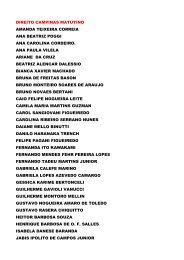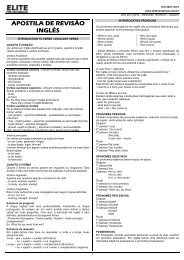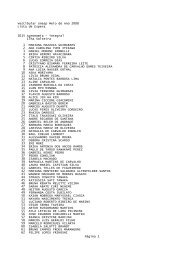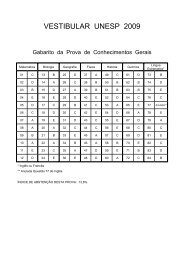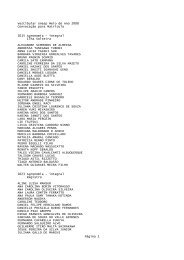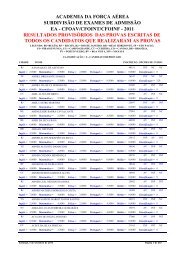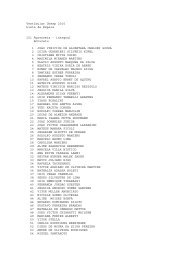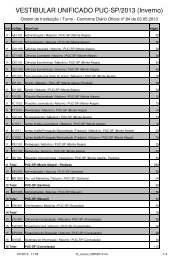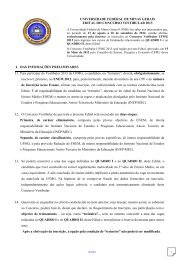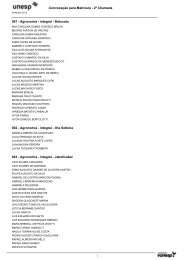FUVEST 2004 PRIMEIRA FASE - Elite Pré-Vestibular-Campinas
FUVEST 2004 PRIMEIRA FASE - Elite Pré-Vestibular-Campinas
FUVEST 2004 PRIMEIRA FASE - Elite Pré-Vestibular-Campinas
Create successful ePaper yourself
Turn your PDF publications into a flip-book with our unique Google optimized e-Paper software.
ELITE<br />
PRÉ-VESTIBULAR<br />
Alternativa B. Incorreta. A autora não cita o computador como<br />
ferramenta de evolução intelectual.<br />
Alternativa C. Incorreta. A autora não cita medidas para a manutenção<br />
da saúde de pessoas que passam horas na frente dos computadores.<br />
Alternativa D. Incorreta. A autora não afirma que as pessoas têm a<br />
ilusão de que computadores resolvem seus problemas.<br />
Alternativa E. Incorreta. A autora não fala de necessidade do<br />
computador na vida das pessoas<br />
84. According to the text, one day<br />
a) computers will be prepared to think the same way we do.<br />
b) computers may understand consciousness limitations better.<br />
c) human beings will program computers which will help them<br />
meditate.<br />
d) human beings will wake up and have better insights towards<br />
computers.<br />
e) computers may teach humans how to deal with their illusions better.<br />
Alternativa E<br />
O último parágrafo do texto apresenta a solução da questão. Ele diz<br />
que os computadores do futuro podem ter algo a ensinar aos<br />
humanos, ao mostrar-lhes como acordar da ilusão, levando à letra E,<br />
que afirma o mesmo usando o recurso da paráfrase, recurso este<br />
muito utilizado para tentar confundir o candidato com pouco<br />
vocabulário.<br />
Texto para as questões de 5 a 8<br />
English is a colonial language that continued to be the official<br />
language after independence in virtually all African countries that were<br />
under British rule. In some cases it was retained to avoid ethnic<br />
tensions. But in all cases it was retained because of its prestige and<br />
association with power. In contrast, the vernaculars were viewed as<br />
backward and inferior, and so were not developed. Students were<br />
made to feel ashamed of their mother tongue and punished for<br />
speaking it.<br />
In Kenya, for example, speaking in vernacular was forbidden<br />
and sanctioned in schools. One popular method of punishment was to<br />
make pupils carry around a skull of some dead animal the whole day<br />
as a way of embarrassing the pupil who dared speak in his mother<br />
tongue.<br />
Today it is difficult to use indigenous languages because they<br />
have not developed, been codified and standardised. Hence there is a<br />
shortage of teaching materials and trained teachers in the vernaculars.<br />
And this has often been used as an excuse for not adopting the<br />
vernaculars in schools.<br />
(The Guardian Weekly, August 2003)<br />
85. Which of these statements is true according to the text?<br />
a) As compared to English, African languages are inferior, poor and<br />
underdeveloped.<br />
b) English has a greater number of rules than most African languages.<br />
c) In former British colonies in Africa, the English language was<br />
adopted because of its prestige and power.<br />
d) Using vernacular languages in Africa was a way of maintaining<br />
peace among different ethnic groups.<br />
e) Adopting English as an official language in some African countries<br />
might result in a stimulus for the development of vernacular languages.<br />
Alternativa C<br />
Referindo-se ao trecho, “But in all cases it was retained because of its<br />
prestige and power”, chega-se à alternativa correta C. A alternativa A<br />
não se aplica porque o texto não faz relação direta entre o Inglês e as<br />
línguas vernaculares; a alternativa B não se aplica porque o texto não<br />
cita regras das línguas; a alternativa D não é correta pois foi o uso do<br />
Inglês acalmou conflito étnicos e, por fim, a alternativa E não pode ser<br />
correta porque o texto afirma que o uso do Inglês tem feito as línguas<br />
vernaculares desaparecerem pouco a pouco.<br />
86. According to the text, in Kenya, students who spoke<br />
their native language at school<br />
a) faced different sorts of punishment.<br />
b) had to carry a dead animal to school.<br />
c) could not speak for a whole day.<br />
d) had to find a skull of a dead animal.<br />
e) felt embarrassed because their mothers were informed.<br />
Alternativa A<br />
<strong>Campinas</strong><br />
O ELITE RESOLVE <strong>FUVEST</strong> <strong>2004</strong> – <strong>PRIMEIRA</strong> <strong>FASE</strong> – PROVA V<br />
O segundo parágrafo do texto descreve um método popular de<br />
punição, deixando subentendido, através do contexto, que há vários<br />
métodos de punição.<br />
87. According to the text, adopting the vernaculars in African schools<br />
today is<br />
a) impossible because of ethnic tensions.<br />
b) used as an excuse for not training teachers.<br />
c) the result of a lack of teaching materials.<br />
d) considered impracticable due to the current limitations of those<br />
languages.<br />
e) slowly changing the status of teachers and speakers of those<br />
languages.<br />
Alternativa D<br />
A resposta encontra-se no seguinte trecho do texto: “Today it is difficult<br />
to use indigenous languages because they have not developed, been<br />
codified and standardised.”<br />
Tradução da alternativa correta: “considerado impraticável devido a<br />
limitações atuais destas línguas”<br />
88. We can say that the author of the passage is<br />
a) convinced that the English language will be beneficial to African<br />
countries.<br />
b) critical of the current status of development of African languages.<br />
c) optimistic about the future of vernacular languages in Africa.<br />
d) discouraged with recent Kenyan government measures concerning<br />
education.<br />
e) certain that better trained teachers are the key factor to improve<br />
Africa’s education system.<br />
Alternativa B<br />
O autor expõe a situação das línguas vernaculares da África, pintando<br />
um quadro preocupante, pois, se esta situação perdurar, as línguas<br />
tendem a desaparecer.<br />
Alternativa A: Incorreta. O autor não cita qualquer convencimento de<br />
que o Inglês será benefício;<br />
Alternativa C: Incorreta. O autor não se mostra otimista sobre o futuro<br />
das línguas vernaculares.<br />
Alternativa D: Incorreta. O texto não cita medidas educacionais do<br />
governo Queniano;<br />
Alternativa E: Incorreta. O texto não cita melhoramentos no sistema<br />
africano de ensino.<br />
BIOLOGIA<br />
89. Qual das alternativas classifica corretamente o vírus HIV, o tronco<br />
de uma árvore, a semente de feijão e o plasmódio da malária, quanto<br />
à constituição celular?<br />
Alternativa B<br />
Os vírus são classificados como microorganismos acelulares, pois<br />
apresentam-se formados por um ácido nucléico (RNA ou DNA, nunca<br />
os dois juntos) no interior de uma cápsula protéica. O tronco das<br />
árvores e a semente são estruturas pluricelulares. O plasmódio é um<br />
protozoário, microorganismo unicelular.<br />
90. A figura mostra etapas da segregação de um par de cromossomos<br />
homólogos em uma meiose em que não ocorreu permuta.<br />
19



